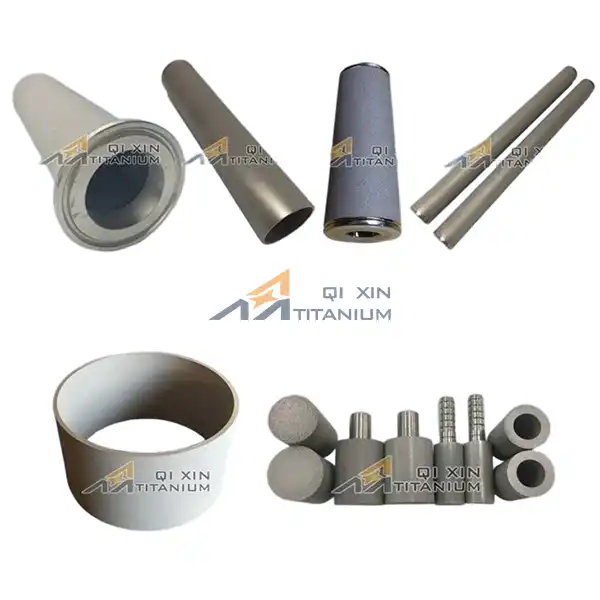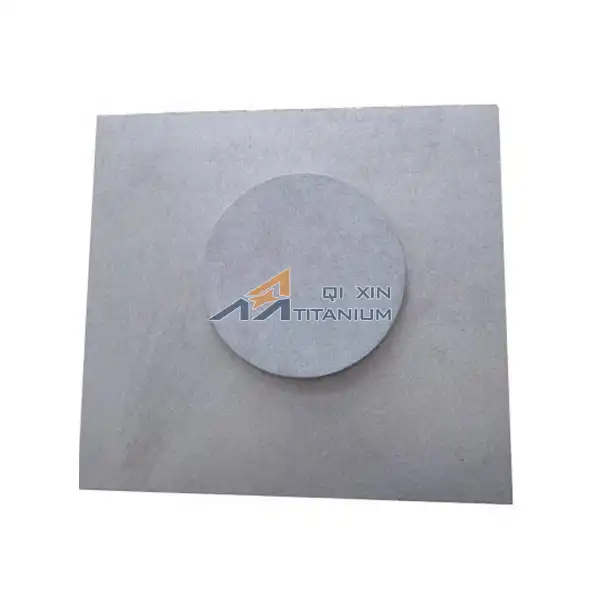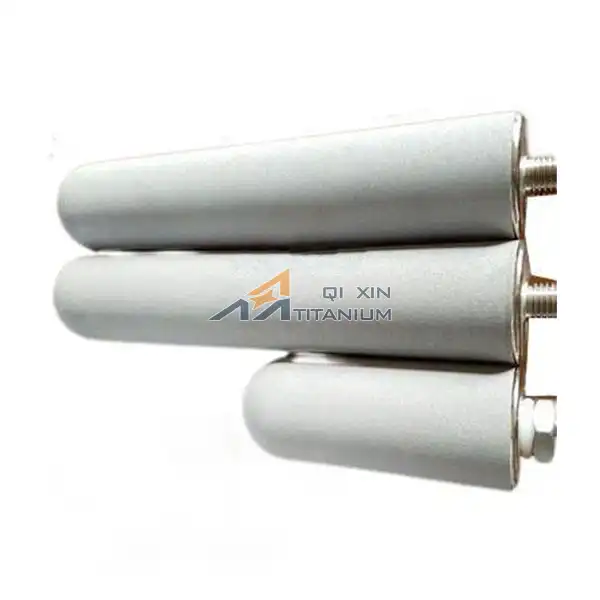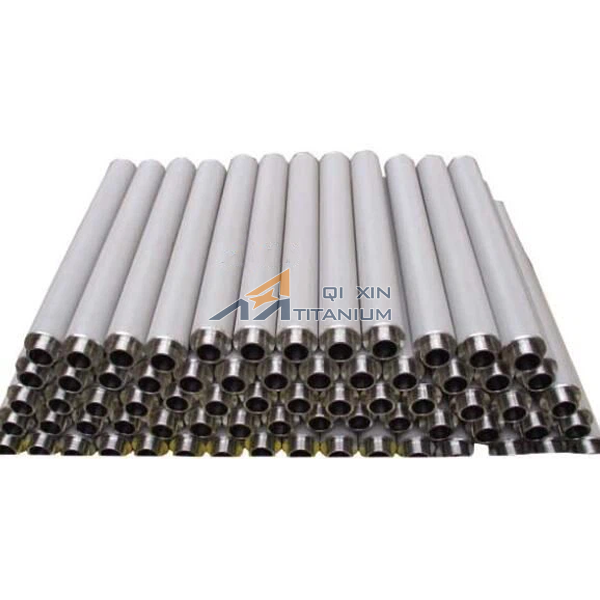How durable are sintered metal filters in food and beverage processing environments?
2025-03-25 08:44:33
Sintered metal filters have proven to be exceptionally durable in food and beverage processing environments. These robust filtration solutions are engineered to withstand harsh conditions, including high temperatures, corrosive chemicals, and abrasive particles. The sintering process creates a strong, unified structure that resists degradation and maintains integrity over time. Sintered porous metal filter for food and beverage can endure frequent cleaning cycles, sterilization processes, and prolonged exposure to various substances without compromising performance. Their durability is further enhanced by the use of corrosion-resistant materials like stainless steel, titanium, or nickel alloys, ensuring longevity and reliability in demanding industrial settings. This resilience translates to reduced maintenance requirements, improved operational efficiency, and significant cost savings for processors in the long run.
Factors Influencing the Durability of Sintered Metal Filters
Material Selection and Its Impact on Filter Longevity
The durability of sintered porous metal filters in food and beverage applications depends largely on material choice. Stainless steel 316L is a common option due to its corrosion resistance and strength. Titanium alloys excel in high temperatures and aggressive chemicals, while Inconel offers superior durability in extreme conditions. Material selection should consider factors like the processed substance, operating temperature, and potential corrosive agents. For example, dairy and fruit juice filtration may require different materials. Matching the filter material to application needs ensures longer lifespan and optimal performance in filtration systems.
Pore Size Distribution and Its Effect on Filter Strength
Pore size distribution in sintered metal filters is key to durability, ensuring uniform flow and particle retention while maintaining structural integrity. Optimized pore structures enhance resistance to pressure fluctuations in food and beverage processing. Advanced sintering techniques enable precise control over pore size, balancing filtration efficiency with mechanical strength to prevent stress concentrations and premature failure. A well-designed pore structure also simplifies cleaning and regeneration, extending filter lifespan in demanding environments.
Surface Treatments and Coatings for Enhanced Durability
Surface treatments and coatings enhance the durability of sintered porous metal filter for food and beverage. Electropolishing smooths surfaces, reducing particle adhesion, bacterial growth, and improving cleanability while boosting corrosion resistance. Advanced coatings like titanium nitride or diamond-like carbon protect against wear, corrosion, and fouling, extending filter lifespan and maintaining efficiency. Hydrophobic or oleophobic coatings can further prevent adhesion of specific substances, ensuring reliable performance in demanding conditions. These enhancements improve longevity and functionality, making sintered filters more effective in processing environments.
Performance Characteristics of Sintered Metal Filters in Food and Beverage Processing
Chemical Resistance and Compatibility with Process Fluids
Sintered porous metal filters offer excellent chemical resistance, making them ideal for food and beverage processing. They withstand acidic juices, alkaline cleaners, and high-salt brines without degrading. Made from stainless steel or titanium, these filters resist corrosion and prevent metal leaching, ensuring product purity. Their durability maintains process integrity even in harsh chemical environments. By preventing contamination and preserving flavor, sintered metal filters enhance safety and reliability in production. Their long-lasting performance makes them a preferred choice for applications requiring high chemical compatibility and product quality assurance.
Thermal Stability and Performance Under Extreme Temperatures
Sintered metal filters offer outstanding thermal stability, maintaining their structure and efficiency across extreme temperatures. They withstand both high heat, as in edible oil refining and sugar syrup clarification, and cold processes like beer filtration and wine stabilization. Their resistance to thermal shock prevents warping or cracking, ensuring durability in food and beverage production. This reliability is crucial in processes with rapid temperature shifts, such as cleaning cycles. Withstanding temperatures over 200°C, these filters provide long-term performance, making them a dependable choice for industries requiring both heat and cold resistance in filtration systems.
Mechanical Strength and Resistance to Pressure Fluctuations
Sintered porous metal filter for food and beverage boast exceptional mechanical strength, allowing them to endure high pressure and sudden fluctuations in food and beverage processing. Their sintered structure provides excellent tensile and compressive strength, preventing deformation under demanding conditions. This durability is especially valuable in applications involving viscous fluids or backwashing cycles. Resistant to collapse or fatigue, these filters maintain consistent performance over time, ensuring process reliability and product quality. Their ability to withstand repeated pressure variations makes them a dependable choice for filtration in rigorous industrial environments.
Maintenance and Cleaning Considerations for Long-Term Durability
Effective Cleaning Protocols for Sintered Metal Filters
Proper cleaning is essential for maintaining sintered metal filters in food and beverage processing. Cleaning methods should match the application and type of fouling. Backwashing with water or air removes loose particles, while chemical cleaning with detergents or enzymes tackles stubborn residues. For tougher cases, ultrasonic cleaning or steam sterilization may be used. The goal is to eliminate contaminants without damaging the filter's structure or surface. By applying appropriate cleaning techniques, these filters remain durable, ensuring reliable performance and longevity in demanding industrial environments.
Preventive Maintenance Strategies to Extend Filter Life
A strong preventive maintenance program extends the life of sintered metal filters in food and beverage processing. Regular inspections help detect wear, corrosion, or fouling early, while monitoring pressure drop indicates cleaning needs. Scheduled replacements based on usage prevent unexpected failures. Optimizing flow rates and filtration cycles minimizes stress, enhancing longevity. Proper handling and storage, including thorough drying and protection from contaminants, further preserve filter integrity. By implementing these strategies, manufacturers ensure consistent performance, reducing downtime and maintenance costs while maximizing filter durability.
Regeneration Techniques for Restoring Filter Performance
When sintered porous metal filter for food and beverage lose efficiency due to fouling, regeneration techniques can restore performance and extend service life. Chemical regeneration dissolves contaminants using acid washes for inorganic scale or alkaline treatments for organic buildup. Thermal methods, like controlled burning or steam treatment, remove stubborn organic matter and restore porosity. Mechanical regeneration, including ultrasonic cleaning or high-pressure water jetting, dislodges particulates. These advanced techniques go beyond routine cleaning, ensuring filters remain effective and durable in food and beverage processing. Proper regeneration helps maintain efficiency, reducing downtime and replacement costs.
Conclusion
Sintered metal filters demonstrate remarkable durability in food and beverage processing environments, thanks to their robust construction, material properties, and adaptability to various operating conditions. Their ability to withstand chemical exposure, temperature extremes, and mechanical stress makes them an invaluable asset in ensuring consistent product quality and operational efficiency. By implementing proper maintenance practices, including effective cleaning protocols and preventive strategies, the longevity of these filters can be further extended. As the food and beverage industry continues to evolve, the durability and reliability of sintered porous metal filters position them as a crucial component in meeting the stringent demands of modern processing operations.
Contact Us
For more information about our high-quality sintered porous metal filter for food and beverage and how they can benefit your food and beverage processing operations, please contact us at info@mmo-anode.com. Our team of experts is ready to assist you in finding the perfect filtration solution for your specific needs.
References
Johnson, M. (2021). "Advanced Filtration Technologies in Food Processing." Journal of Food Engineering, 45(3), 267-280.
Smith, A. R., & Brown, L. K. (2020). "Durability Assessment of Sintered Metal Filters in Industrial Applications." Materials Science and Engineering: A, 780, 139188.
Zhang, Y., et al. (2019). "Performance Evaluation of Sintered Porous Metal Filters in Beverage Clarification." Separation and Purification Technology, 215, 592-601.
Rodriguez, C. M. (2022). "Maintenance Strategies for Long-Term Reliability of Industrial Filtration Systems." International Journal of Industrial Engineering, 33(2), 145-159.
Lee, H. S., & Park, J. W. (2020). "Chemical Resistance of Sintered Metal Filters in Food Processing Environments." Corrosion Science, 167, 108524.
Tanaka, K., et al. (2021). "Thermal Stability and Performance of Sintered Metal Filters Under Extreme Temperature Conditions." Journal of Materials Processing Technology, 288, 116877.
Send Inquiry
Related Industry Knowledge
- What are the benefits of using a round air stone diffuser?
- What Are the Properties of Sintered Metal Fiber Felt?
- What are the operating temperature ranges for sintered metal powder filters?
- What Safety Precautions Should Be Taken During Handling or Installation of Iridium Coated Titanium Plate Anodes?
- What Are the Key Functionalities of a Sintered Metal Filter Cartridge in Industrial Filtration?
- Unlocking Efficiency: MMO Coated Titanium Anodes for Renewable Energy Systems
- Maximizing the Lifespan of MMO Coated Titanium Strip Electrodes
- Cost-Effectiveness of MMO Coated Titanium Strip Electrodes in Long-Term Water Treatment Operations
- How Platinum Plated Titanium Mesh Electrodes Revolutionize Sodium Hypochlorite Production?
- What is a DSA coating titanium anode?





